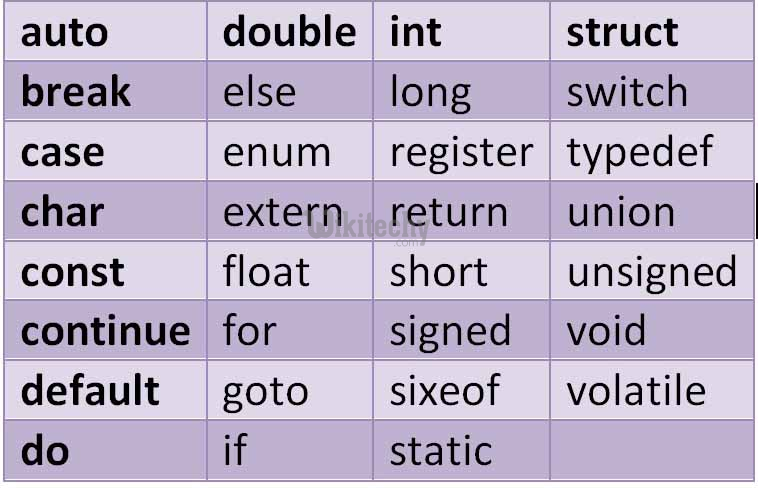| keywords |
syntax |
description |
| 1.auto |
[auto] data-definition; |
Defines a local variable having a local lifetime. |
| 2.break |
break; |
Passes control out of the compound statement. |
| 3.case |
case constant-expression: |
The list of possible constant-expression values determined from all case statements is searched for a match. |
| 4. char |
char variable_name; |
Char datatype Specifies the character type of the value a variable will hold |
| 5. const |
const variable-name [ = value]; |
Makes variable value or pointer parameter unmodifiable. |
| 6.continue |
continue: |
Passes control to the beginning of the loop.. |
| 7.default |
default: |
If a match is not found, its goto default statement. |
| 8.do |
do statement while (expression): |
Keyword “do” is usually used together with while , to make another form of repeating statement. |
| 9.double |
double variable_name: |
Represents a double precision floating point data type. |
| 10.else |
|
In C Language, else extends an if statement to execute a statement if statement evaluates FALSE instead of TRUE.. |
| 11.enum |
enum [tag] {name [=value], ...}; |
enum is the user defined data type. |
| 12.extern |
extern data-definition;extern function-prototype; |
extern keyword means "declare without defining". By default, the declaration and definition of a C function have “extern” with them. |
| 13.float |
float variable_name: |
Floating point is a data type in terms of decimal format .. |
| 14.for |
for ([expr1]; [expr2]; [expr3]) statement |
For-loop is yet another kind of loop. |
| 15.goto |
goto identifier; |
Unconditionally transfer control.. |
| 16.if |
if (expression)statement1 |
Floating point is a data type in terms of decimal format .. |
| 17.int |
int variable_name; |
Floating point is a data type in terms of decimal format .. |
| 18.long |
Long variable_name; |
Specifies a variable that will hold fairly large integer type of data.. |
| 19.register |
register data-definition; |
Tells the compiler to store the variable being declared in a CPU register... |
| 20.return |
return [expression]; |
Exits immediately from the currently executing function to the calling routine, optionally returning a value. .. |
| 21.short |
short variable_name |
Specifies a variable that can hold fairly small integer type of data. |
| 21.signed |
|
Specifies a variable that can hold positive and negative integer type of data. |
| 22..signed |
|
Specifies a variable that can hold positive and negative integer type of data. |
| 23.sizeof |
sizeof expressionsizeof (type) |
Returns the size of the expression or type. |
| 24.static |
static data-definition;static function-definition; |
Preserves variable value to survive after its scope ends.. |
| 25.struct |
struct [struct-type-name] {[type variable-names] ;...} [structure-variables] ; |
Specifies a variable that can hold positive and negative integer type of data. |
| 26.switch |
switch (expression) statement |
Switch causes control to branch to one of the list of possible statements in the block of statements.. |
| 27.typedef |
typedef type-definition identifier; |
In C language typedef keyword is used to explicitly associate a type with an identifier.. |
| 28.union |
union [union-type-name]{type variable-names;...} [union-variables] ; |
Groups variables which shares the same storage space. Apart from this Union is used for grouping different types of variables under the single name .. |
| 29.unsigned |
unsigned variable_name; |
Specifies a variable that can hold only the positive integer type of data.. |
| 30.void |
typedef type-definition identifier; |
In C language typedef keyword is used to explicitly associate a type with an identifier.. |
| 31.volatile |
volatile data-definition; |
In C , It tells the compiler that the value of the variable may change at any time- without any action being taken by the code .. |
| 32.while |
while (expression) statement |
Repeats execution while the condition is true.. |

